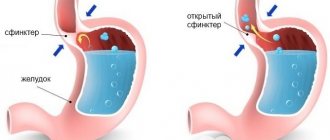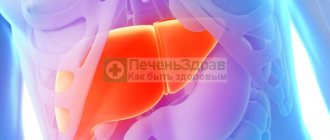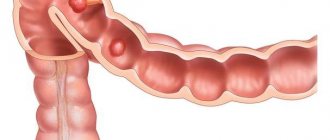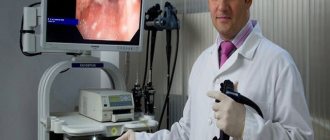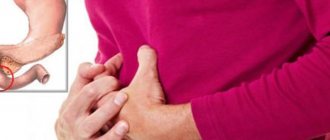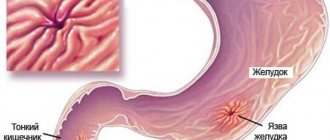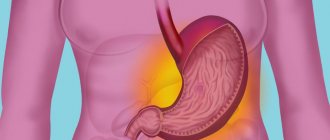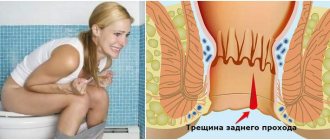Proctology is a branch of medicine that deals with the diagnosis, research, treatment and prevention of any diseases and pathologies of the anal and anal zones, as well as the rectum, colon and nearby organs. Proctology got its name from the combination of the Greek words proktos - anus and logos - study. Recently, this medical branch has been called coloproctology, since the doctor’s specialization also includes the study of the colon, the name of which was included in the title.
What does a proctologist treat?
The specialization of a proctologist includes the treatment and prevention of the following diseases:
- Colitis (ulcerative and common);
- Proctitis;
- Paraproctitis;
- Haemorrhoids;
- Rectal prolapse;
- Benign and malignant processes in the large intestine;
- Colon polyps;
- Ruptures and injuries of the rectum;
- Anal fissures that do not heal for a long time.
At the appointment, the proctologist collects an anamnesis of the patient’s life and illness, conducts a digital rectal examination, and prescribes additional diagnostic methods (endoscopic, laboratory and instrumental).
Treatment methods
The treatment that a coloproctologist will prescribe depends on the specific disease, its stage, the severity of symptoms and the condition of the patient’s body. Drug treatment is usually prescribed for helminthic infestations, intestinal infections and the initial stages of diseases that do not require surgical intervention.
In more severe cases (for example, with advanced hemorrhoids), patients are advised to undergo surgery, which in modern clinics can be performed using minimally invasive methods. Thus, treatment of hemorrhoids can be performed using sclerotherapy, radio wave therapy, infrared coagulation and other methods. Traditional operations are usually performed in the presence of benign and malignant tumors in the intestines, intestinal obstruction and other conditions that may pose a threat to the health and life of the patient.
Surgery
Non-drug solutions to problems and prevention of diseases include a diet that improves the functioning of the gastrointestinal tract, elimination of factors that provoke the development of pathologies (bad habits, sedentary lifestyle), and careful adherence to personal hygiene.
Rejection of bad habits
Coloproctology is a specific branch of medicine that studies problems that are not usually discussed out loud. However, it is strictly not recommended to ignore the symptoms of intestinal and anal diseases, as they can lead to serious complications and consequences. When the first signs of pathology appear, you need to go to an appointment with an experienced coloproctologist, who will make the correct diagnosis and prescribe appropriate treatment.
When is it necessary to consult a proctologist?
Diseases of the large intestine are a pressing problem for every second resident of the capital, but not everyone seeks qualified help due to embarrassment. In fact, this attitude towards one’s health most often leads to the disease becoming chronic or causing serious complications. The following symptoms are the reason for immediately contacting a proctologist:
- False urge to defecate;
- Discharge of mucus, blood or pus in the stool;
- Chronic diarrhea or constipation;
- Haemorrhoids;
- Long-term non-healing anal fissures;
- Painful bowel movements accompanied by cramping abdominal pain;
- Worm infestations;
- Prolapse of the rectum when straining.
Consultation with a proctologist is necessary for people suffering from constant bloating and flatulence.
Advantages
The main focus is minimally invasive treatment. Colectomy began to be performed not only using the laparoscopy method, but also through the open method . Problems of hemorrhoids and anal fissures can bother the patient for a long time. But why bother if you can get rid of them in the shortest possible time .
Along with surgical interventions, laser interventions began to be performed. The advantages of visiting a coloproctologist are obvious:
- the possibility of getting rid of pain that occurs not only during bowel movements, but even at rest;
- After the intervention, when using a laser, recovery time is reduced . Healing occurs much faster than after surgery;
- laser intervention takes place practically without bleeding;
- Laser equipment disinfects the area, therefore minimizing the risk of infection.
A professional approach will help you get rid of problems in a short time. No recovery time is required.
Where to find a good proctologist?
If you don’t know where to find a good proctologist in Moscow, use our website.
Opposite the name of each doctor is a rating, the indicators of which are based on the frequency of user requests, experience, length of service and the presence of laudatory reviews from patients. In order not to waste time, but to immediately choose the best proctologist from the list of proposed candidates, read the reviews sections. Detailed descriptions of other patients’ impressions of the proctologist will allow you to quickly decide which doctor to make an appointment with.
Proctological examination of the patient
What it is, coloproctology, is described above. This section of medicine is devoted to the study and treatment of proctological diseases. Specialists examine the patient using the latest hardware and laboratory research methods, including:
- finger examination;
- bacterial culture of feces.
In addition, they carry out:
- sigmoidoscopy;
- anoscopy;
- colonoscopy;
- check the anal reflex;
- performs ultrasound of the abdominal cavity;
- anal and rectal endosonography.
Moreover, additional types of studies may be prescribed, which include biopsy and electromyography. If necessary, doctors prescribe magnetic resonance imaging. Based on the diagnostic results obtained, the doctor can detect the early stage of the disease and make an accurate diagnosis, so that effective therapy can be started and the unpleasant symptoms of the disease can be eliminated.
How to get an appointment with a proctologist?
Appointments with a proctologist are carried out by appointment, which allows you to avoid waiting in line and plan your schedule in advance. You can make an appointment with a doctor by calling the clinic indicated in the contacts column or online on our website.
Before going to the proctologist, the patient must undergo a cleansing enema or empty his bowels on his own.
The profession of “proctologist” is included in the list of the funniest specialties. It is believed that the object of study of this specialist is an organ that is not usually mentioned in polite society. At least until the services of this specialist are needed by those who like to joke about this profession. But everything is not as simple as it might seem at first glance, and the scope of what a proctologist treats is much wider than narrow “outhouse” humor.
Proctology as a field of medical knowledge examines the diagnosis, treatment, research and prevention of diseases of organs such as the rectum, colon and adjacent organs. Thus, what a proctologist treats most likely relates to the gastrointestinal tract rather than the anus.
But diseases associated with the anus are also within the scope of competence of such a specialist. And in general, this profession currently has the correct name - coloproctologist. And this concept is somewhat broader than what is commonly heard. How does such a doctor differ from a proctologist, what does he treat, and why is there a “colo” prefix in this name? Previously, his “field of activity” was purely rectal diseases. At the moment, the scope of activity has also expanded to adjacent organs, since their diseases are often closely interrelated and affect the large intestine.
There is one more area that a proctologist is involved in. What does this specialist treat, besides diseases and inflammatory processes in the intestines? This is a delicate area, called hemorrhoids - inflammation and thrombosis of the hemorrhoidal veins located in the anus. This disease is the leading one among proctologist patients.
When should you undergo a mandatory examination by a specialist in this field of medicine? Despite the fact that a proctologist treats intestinal diseases, a mandatory visit to him is indicated not only for people suffering from any symptoms of these diseases. Examination is required for the following categories of people:
- pregnant women in the third trimester or women after recent childbirth;
- women who have entered menopause;
- people suffering from excess weight;
- those who, for some reason, spent a long time in a sitting position (for example, due to a serious illness);
- those people whose relatives suffered from rectal cancer, if their age is over forty years.
Having found out what a proctologist treats, we can identify the following symptoms when his consultation is extremely necessary. This:
- regular constipation or diarrhea;
- pain in the anus, which is activated when walking or sitting;
- formation of swelling in the anus;
- the appearance of blood in the stool;
- sensation of a foreign body in the anus;
— exit to the outside of the hemorrhoidal node.
Now it’s clear who a proctologist is and what this doctor treats. If you notice any of the above symptoms in yourself, then it is possible that your intestines are functioning intermittently, which means that you need a specific diagnosis and the appointment of qualified treatment from such a specialist.
Coloproctology or proctology: where to go
Many patients are interested in what is the difference between the concepts of “coloproctologist” and “proctologist”. Both medical professions belong to the same field of medicine - coloproctology, which studies diseases and pathological processes in the rectum. Most ordinary people believe that a coloproctologist is a doctor with a broader specialization who deals with diagnosis and treatment, both medicinal and surgical. A proctologist only conducts an examination, makes a primary diagnosis and engages in preventive therapy.
In fact, these two medical concepts have no difference. These are two names of one profession. The difference in name is due to changes in international standards in medicine. And since 1997, “proctology” was changed to “coloproctology” due to the expansion of the scope of work related to the diagnosis and treatment of various diseases of the rectum and sacrococcygeal spine.
Who needs a consultation with a proctologist?
The main reason for the development of severe pathologies of the rectum and colon is ignoring the symptoms of existing disorders and untimely consultation with a doctor. Most patients (more than 80%) are embarrassed to tell someone about “delicate” problems, but it is important to understand that sooner or later you will still have to contact a specialist, but the chances of a full recovery will be several times lower than with early detection of existing pathologies .
An annual examination by a proctologist is necessary for people at risk for colorectal cancer and malignant intestinal diseases. These are, first of all, patients over 60 years of age, people suffering from obesity, chronic constipation, vascular disorders, which can lead to impaired blood supply to the large intestine and the development of ischemic colitis. Regular intestinal checks are also necessary for those who do not follow the principles of a healthy diet and abuse alcohol. The risk group also includes smokers: it has been proven that long-term smoking (longer than 3 years) increases the risk of developing colon cancer by almost 3 times.
An emergency (unscheduled) consultation with a proctologist is required if the following indications exist:
- anal bleeding (including mild spotting);
- the appearance of mucus, streaks, inclusions and undigested particles in the stool;
- prolonged stool disorder (alternation of prolonged constipation with functional diarrhea is especially dangerous);
- change in the color and smell of feces, the appearance of a foul odor from feces;
- painful urge to defecate;
- pain during bowel movements and after;
- itching and irritation in the pararectal and anorectal area;
- signs of dyspepsia, provided that they occur against the background of at least one of the listed symptoms.
Important! A dangerous diagnostic symptom is the sensation of a foreign body in the rectum, which intensifies during the advancement of the fecal bolus. This sign may indicate tumor diseases, so it should never be ignored.
Stages of inspection
Before visiting a proctologist, girls often have questions about how women are examined, whether there are any peculiarities and nuances during the examination.
Usually, both sexes receive the same treatment according to the standard procedure.
The examination is carried out in several stages, some of them are additional and are prescribed for the purpose of additional examination.
- First of all, the proctologist begins the consultation by interviewing the patient and his complaints. The initial appointment includes the mandatory collection of anamnesis and detailed information about the patient’s condition. On a second visit, the doctor assesses the effectiveness of treatment and the dynamics of the course of the disease from the patient’s words.
It is advisable to prepare in advance to answer the most common questions about stool frequency, consistency, the presence of impurities in it, the quality of nutrition, and report on concomitant diseases.
In case of complaints of pain or discomfort, one should try to explain their nature and location as accurately as possible.
The more accurately the clinical picture is formulated, the easier it is for the doctor at the appointment to establish a preliminary diagnosis and prescribe additional studies and therapy.
- The second stage is a visual examination of the patient. The girl must undress from the waist down and sit in a chair resembling a gynecological one. Sometimes an examination by a proctologist is carried out on a couch in the knee-elbow position. The doctor examines the perianal area, examines hemorrhoids if there are external nodes, and can also identify cracks, various formations (papillomas, condylomas), paraproctitis (fistula tracts).
- The third stage is a digital examination of the rectum and anus. The procedure is painless, but some discomfort may be present. The doctor checks hemorrhoids (the presence of internal nodes), its stage, assesses sphincter tone, volitional effort, and can identify ulcers, cracks, and tumors.
- The fourth stage is an instrumental examination, which is prescribed additionally and requires preparation. These research methods are widely used in medicine because they have high reliability of results.
Anoscopy - the doctor examines the patient using a rectal speculum with an LED - anoscope - to assess the condition of the distal intestine at a distance of up to 14 cm.
Instrument for examining a patient (anoscope)
Sigmoidoscopy - an endoscopic device allows the proctologist to penetrate a length of about 40 cm in order to examine the mucous epithelium of the rectum and sigmoid colon. The method is effective in determining in these areas of oncology what the doctor looks at first.
Colonoscopy is the most reliable endoscopic method for diagnosing the large intestine, capable of examining all its parts and, if necessary, part of the small intestine. Additionally, there is the opportunity to perform some surgical procedures (taking a biopsy, removing a polyp, cauterization).
The procedure is characterized by significant discomfort and pain during the procedure, so in some cases it can be performed under general anesthesia.
To clarify the diagnosis, a proctologist may prescribe x-ray examinations, as well as a set of laboratory tests.
List of diseases
To understand exactly when it is necessary to seek the help of a proctologist, you need to know what diseases are treated by a specialist in this profile.
Haemorrhoids
This is the most common pathology of the rectum, occurring mainly in people leading a sedentary lifestyle. Weakened immunity, bad habits, endocrine and vascular disorders can contribute to inflammation and dilation of the veins of the hemorrhoidal plexus. In women, hemorrhoids are the most common complication of pregnancy and childbirth.
Symptoms:
- swelling of the veins of the hemorrhoidal plexus, prolapse of hemorrhoids beyond the anus;
- itching around the anus that does not go away after correcting the hygiene regime and emotional state;
- anal bleeding of varying intensity;
- pain in the pararectal area, worsening after prolonged sitting;
- painful bowel movement.
A rectal examination of the patient using a finger allows you to determine the presence of inflamed hemorrhoids, their size, number, and degree of reduction. The doctor also examines the rectal mucosa for erosions, ulcerations, increased pigmentation, scars, and polypous growths. If the inflammatory process is accompanied by the release of exudate, a specialist will be able to visually assess its amount and identify signs of purulent processes.
The effectiveness of digital examination for hemorrhoids is about 90% . To confirm the diagnosis, the patient may be prescribed sigmoidoscopy or examination of the rectum using an ultrasound probe.
Injuries, damage and cracks
These terms refer to spontaneously occurring defects (ruptures) in the epithelial lining of the anal canal. This is the second most common proctological pathology, second only to hemorrhoids. The main cause of cracks is stool disorders (prolonged constipation or diarrhea lasting more than 3 days). If a person follows the rules of hygiene and a gentle regime, such cracks will heal on their own within 7-10 days.
A more severe clinical form, with which patients usually consult a doctor, are chronic fissures, in which not only a local defect is visualized on the surface of the epithelial membrane, but also exposed areas of the muscles that form the anal sphincter.
Symptoms:
- severe pain of a sharp or cutting nature during or after defecation;
- prolonged spasm of the sphincter, manifested by constant pain and causing sleep disorders and behavioral changes (the person becomes irritable, restless);
- anal itching;
- bleeding of varying intensity (from drip to jet).
To diagnose anal fissures, in most cases, a digital examination and visual examination of the rectum are sufficient.
Anal tumors
Rectal tumors can be benign (polyps, cysts) or malignant (colorectal cancer). It is almost impossible to diagnose the pathology at an early stage due to the lack of specific symptoms. Tumors can grow in the intestines for several years, and the patient’s only complaints are usually flatulence, bloating, and stool problems. Pain syndrome in benign tumors, as well as stage 1-2 cancer, is practically absent, so only a doctor can draw a conclusion about the state of a person’s health based on the meager symptoms available, based on the results of an instrumental and digital examination.
To diagnose tumors, the patient is usually prescribed sigmoidoscopy, colonoscopy or irrigoscopy, during which biological material is collected for further histological examination. To confirm the diagnosis, a blood test for tumor markers is also performed. Secondary diagnostics aimed at identifying sites of metastasis (in most cases, metastases occur in the liver tissue) is of great diagnostic importance.
Important! The average survival prognosis for malignant intestinal lesions is about 2-5 years from the start of treatment, so you should not delay visiting a proctologist if a person is at risk or notices alarming symptoms.
Inflammatory processes
Inflammation of the mucous membranes of the anus is called proctitis. Pathology often occurs due to improper treatment of infectious intestinal diseases, poor intimate hygiene, and frequent wearing of synthetic underwear. Typical manifestations of proctitis are pain during bowel movements, bloating, flatulence, and cramping pain in the lower abdomen. To diagnose proctitis, various examination methods are used: digital examination, laboratory diagnostics of stool, hardware and instrumental methods.
How is the inspection carried out?
An examination by a coloproctologist, as a rule, consists of several stages, each of which plays an important role in making a diagnosis. First of all, the patient’s complaints and medical history are collected, an external examination of the skin of the abdomen, palpation of the intestines, then a digital rectal examination of the anus. This is a specific procedure that causes some discomfort to patients - if a person experiences severe pain due to damage to the anus, hemorrhoids, or for other reasons, the doctor can use an anesthetic gel or spray.
Examination by a coloproctologist
Based on the results of the initial examination, the coloproctologist prescribes additional diagnostic tests. These include:
- anoscopy, colonoscopy and sigmoidoscopy (examination of the intestinal mucous membranes using special instruments);
- ultrasonography;
- x-ray, usually using a contrast agent;
- smear for enterobiasis;
- stool tests - biochemical, coprogram, for the presence of worm eggs or occult blood.
Coprogram is the norm
In some cases, patients need to additionally take blood and urine tests, as well as consult with other specialists.
How to prepare for your appointment?
If a consultation with a proctologist is prescribed for a person for the first time, no special preparation is required, but it is better to adhere to a gentle diet 2-3 days before the appointment.
o is necessary to reduce gas formation in the intestines, reduce discomfort in the lower abdomen and avoid involuntary release of gases during palpation or insertion of instruments into the rectal cavity. You should avoid any foods that increase flatulence and bloating, as well as cause fermentation and putrefaction in the intestines. These products include:
- refined sugar;
- vegetables with a high content of starch or puric acid (cabbage, potatoes, beets, green peas, spinach, artichokes);
- sparkling water and lemonades;
- mushrooms;
- chocolate and products prepared with cocoa butter;
- whole cow's milk.
If you suspect inflammatory processes, you should avoid spicy and too acidic foods - such dishes irritate the intestinal walls and can cause an increase in existing symptoms. These are spices, seasonings, marinades with the addition of vinegar, brine, smoked meats, citrus fruits.
Preparing to visit the doctor
Since an examination by a proctologist is often carried out using internal palpation and a number of other techniques that involve examining the rectum from the inside, it is necessary to prepare for the visit.
For the most successful diagnosis and assessment of the condition of the intestines, you should first clean the passage with an enema with a volume of 1 to 1.5 liters. To fill it, you should use only clean tap water, without any additives or impurities, as they can disrupt the natural intestinal microflora and affect the correct diagnosis. This procedure should be carried out the day before the visit, a couple of hours before going to bed.
It is highly recommended to follow a simple diet before visiting a doctor. It will reduce gas formation and help make a more accurate diagnosis. A few days before your visit to the proctologist, you should exclude the following foods from your diet: all legumes without exception, brown bread, raw fruits and vegetables, milk.
Such actions will help the specialist conduct a better internal examination, anoscopy and check the condition of all sections of the intestine through palpation of the anterior abdominal wall. And the patient will be able to avoid repeated examinations and lengthy diagnostics.
What kind of doctor is this
Most specialists in this area begin their careers working as hospital surgeons - they perform abdominal and endoscopic operations on various organs of the abdominal cavity and perianal region. And the longer they improve in the surgery department, the better. After all, the work of a coloproctologist is akin to the art of jewelry.
To become a proctologist, you must first train as a surgeon. Then, choose a narrow specialization (proctology) and receive additional education in it. Then years of practice in inpatient hospitals - operations, dressings, rehabilitation measures...
Having gone through this entire long period of formation, the surgeon acquires the most complete understanding of the processes that occur in the internal organs of a person. In the future, he will be able to use the acquired practical knowledge to predict the possible consequences of treating hemorrhoids and other proctological diseases.
Preventive measures: recommendations from doctors
To prevent the development of the disease, it is important to follow the recommendations of doctors. It is necessary to organize meals. Most often, a disrupted diet provokes the development of many pathologies. The diet should contain more fiber, vitamins and minerals. It is advisable to exclude animal fats from the diet. By consuming enough vegetables and fruits, you can protect your body from the appearance of cancer. It is important to undergo regular medical examinations and follow basic hygiene rules. You should lead an active lifestyle. Therapeutic exercises are an excellent prevention of proctological disease and pathology of the large intestine. It is necessary to engage in fitness, perform simple physical exercises throughout the day. If symptoms of the disease appear, you should visit the Institute of Coloproctology.
How are proctological pathologies treated abroad?
If a person turns to a coloproctology center located abroad, then you can count on the help of qualified specialists and advanced diagnostic standards. Thanks to modern treatment methods and high-precision research, it is possible to detect the disease at a very early stage of development. Most often, a non-surgical method of therapy is used abroad.
For example, in the treatment of hemorrhoids, infrared photocoagulation, sclerotherapy, radiofrequency ablation, and Doppler disarterization of the hemorrhoid are used. If it is necessary to cure colorectal cancer at an early stage or a benign tumor of the colon, then foreign doctors use a gentle type of surgery, most often laparoscopic.
Many people are interested in: coloproctology - what is it? But not everyone knows that this is a branch of medicine that studies diseases of the anus. In the same way, people do not know that treatment abroad is not always affordable. For example, a hospital in Minsk, where the proctology department is located, will help to effectively and inexpensively treat proctological diseases.
Surgeon-coloproctologist
Unlike a coloproctologist, a surgeon deals with surgical and neurosurgical treatment of diseases of the colon and rectum, including neoplasms of various types. The activities of a coloproctologist surgeon are as follows:
- laser surgery;
- emergency surgery;
- oncoproctology;
- coloproctology;
- electrowave surgery;
- surgery;
- purulent surgery.
The doctor’s competence includes the treatment of purulent pathologies of soft tissues, surgical complications after intervention in the peritoneal organs. These are complications such as intestinal fistula, abscess, peritonitis.
Basic rules of preparation
In order for the examination by a specialist to be as informative as possible, it should be approached thoroughly.
Proper preparation for the examination includes dietary restrictions (diet), cleansing of all parts of the intestines with an enema or laxatives.
Dietary restrictions
1-2 days before the proctological examination, avoid eating foods that cause gas formation. Vegetables that contain a lot of fiber, such as cabbage, should also be avoided.
You should not eat yeast dough, carbonated drinks, or sweets. During this period, activated carbon is recommended - this can reduce gas formation.
Do I need to do an enema before the appointment?
Experts recommend using an Esmarch mug before examining the intestines as the simplest but most effective method of cleansing it.
The enema is done at night and in the morning 2-3 hours before the appointment, and you should not have dinner or breakfast. In the evening, 2 enemas are given 3-4 hours apart.
Colon cleansing is carried out with warm water (2 l). A rubber container is filled with liquid, the temperature of which is +36...+37 ᵒC, the end of the tube is lubricated with Vaseline, and it is inserted into the anus. After about 15-20 minutes, the urge to defecate begins.
Preparation process without using an enema
If there are problems in the anus (bleeding, advanced hemorrhoids), the enema should not be used. Laxatives are prescribed .
It is advisable to have a bowel movement early in the morning before visiting a doctor.
Microlax as an aid to preparation for examination
This drug is easy to use and quick-acting. The urge to defecate begins 20 minutes after administration. It is enough to carry out one morning procedure after consultation with a specialist.
According to indications, the Microlax enema can be prescribed in the evening. After the morning manipulation, eating and drinking are not recommended.
How to get an appointment with a proctologist
In city, regional, and district clinics you can make an appointment with a proctologist for free. But since there are few specialists in this field, not all clinics will have a proctologist on staff. Only large medical institutions have such specialists and corresponding departments with the necessary equipment and equipment.
Please note! You can get a free appointment only after visiting your local therapist and by appointment.
There are also private offices in medical centers where you can get medical advice without waiting in line for a long time and without a referral from a therapist. Consultation with a proctologist is carried out here only on a paid basis, and prices per visit vary depending on the qualifications of the doctor, the status of the medical center and its location.
Thus, a paid proctologist in Moscow and St. Petersburg will cost an average of 2,000 rubles,
in Chelyabinsk, Voronezh and Yekaterinburg - 1200 rubles, proctologist in Nizhny Novgorod and Ufa - 800 rubles, in Kazan, Perm, Krasnoyarsk and Penza - 400 rubles. These are the prices for an initial doctor’s appointment, further visits depend on the patient’s condition and the complexity of the case .
Some private offices provide such a service as calling a proctologist at home. In this case, the specialist collects information about the patient and conducts a visual examination. In-depth studies, diagnosis and treatment are carried out only on an outpatient basis.
You can also get a consultation with a proctologist free of charge online, on specialized Internet resources. The disadvantage of such a consultation is the lack of possibility of diagnosing and examining the patient.
Making an appointment with a proctologist and choosing to receive a consultation depends on several factors: the general condition of the patient, the degree of symptoms that have arisen, the presence of high fever and other dangerous manifestations.
Acute symptoms indicate a serious illness, so you should not postpone a visit to the doctor, and in especially severe cases that threaten the patient’s life, you should immediately call an ambulance.
If symptoms are minor, you can make an appointment with a therapist and then receive a referral to a proctologist.
Appointment with a coloproctologist
An appointment with a specialist can be made immediately, or by referral from a therapist - it all depends on the rules of the medical center where the patient goes. The appointment is carried out approximately according to the same scheme as with other specialists. The doctor listens to complaints, conducts a survey on the data of interest, makes a preliminary diagnosis, prescribes diagnostics:
- CBC, including testing for worm eggs, occult blood;
- OAM, specific urine problems as needed;
- coprogram;
- blood test for biochemistry;
- anoscopy (examining the anus);
- colonoscopy (assessing the condition of the colon);
- sigmoidoscopy (assessment of the condition of the rectum, sigmoid colon);
- Ultrasound of the peritoneal organs;
- gastroscopy (checking the gastric mucosa);
- X-ray with contrast;
- CT scan allows you to clearly see the condition of the intestinal walls.
Already during the examination, a coloproctologist can identify anal fissures and hemorrhoids. Some diseases are difficult to diagnose even after a series of studies; sometimes it is necessary to involve other doctors (oncologist, etc.).
How to eliminate painful sensations?
The doctor prescribes the method of therapy depending on the identified diseases. To ease a painful attack, doctors at the State Scientific Center for Coloproctology advise:
You should know that painkillers will only mask the unpleasant symptoms of the disease. Only a doctor can prescribe effective treatment for the pathology. With the help of “Nurofen”, “Ibuprofen”, “Noshpa” it will be possible to eliminate the discomfort only for a while.
How to prepare your bowels
Bowel cleansing is an important step in preparation for an examination. This procedure allows the doctor to make the diagnosis as accurately as possible.
Cleansing procedures can be done in various ways:
- cleansing with enema and water;
- cleansing with pharmaceutical enemas;
- use of laxatives.
How to prepare and how to properly cleanse the intestines is decided after a preliminary consultation with a proctologist. In some cases, with bleeding, polyps, or anal fissures, enemas are contraindicated.
The doctor selects the most comfortable and less traumatic method of cleaning the rectum.
Is colon cleansing always done?
This procedure is mandatory for almost all patients. But with rare exceptions, manipulation is not carried out in emergency cases.
In what cases is bowel cleansing not done at home:
- with severe lesions of the colon, anus,
- if there is a risk of bleeding after the cleansing procedure;
- oncological neoplasms.
In these cases, enema cleansing can be replaced by taking laxatives after consultation with your doctor.
How much does the examination cost?
Prices for specialist services differ in each region. They depend on the pricing policy of the clinic, the qualifications of the specialist, location and some other factors.
In a public hospital, you can do all this practically for free, not counting illegal bribes, whoever gives how much. The main material costs will be associated with the purchase of disposable gloves, a diaper and some other accessories that will be on the list from the specialist.
However, it is no secret that modern equipment and highly qualified specialists conduct consultations in private clinics, and they charge a lot of money for this. In most cases, they do the following: first they go to the hospital, if something serious is discovered, they go to a private clinic.
Approximate prices for proctologist services in Moscow:
- preliminary consultation with a specialist – from 1 thousand rubles. up to 20 thousand rubles;
- computed tomography of the large intestine – from 3 thousand to 15 thousand rubles;
- MRI of the intestine – from 19 thousand to 30 thousand rubles;
- scintigraphy of the gastrointestinal tract – from 6 thousand to 13 thousand rubles;
- endoscopy – from 250 to 30 thousand rubles;
- Ultrasound – from 500 to 5 thousand rubles;
- blood and urine testing - from 120 to 3 thousand rubles;
- stool examination – from 100 to 5 thousand rubles;
- operations – from 15 thousand to 100 thousand rubles.
The full cost of services is calculated for each client individually. All you have to do is come to the proctologist’s office, pay for the first consultation, and everything else will be quickly calculated.
What diseases treated by a doctor
A proctologist (coloproctologist) diagnoses and selects treatment methods if problems arise in the end part of the colon and nearby organs.
What does a proctologist treat:
- Hemorrhoids of varying severity;
Hemorrhoids is a common disease treated by a proctologist.
- Inflammatory bowel diseases (sigmoiditis, proctitis, cryptitis, colitis);
- Anal fissures;
- Ulcerative intestinal lesions;
- Diverticular disease;
- Polyps, fistulas, perianal condylomas;
- Oncological neoplasms;
- Intestinal dysfunction;
- Congenital intestinal anomalies;
- Purulent damage to the tissues of the rectum (paraproctitis);
- Coccyx cyst;
- Rectal prolapse;
- Muscle dysfunction of the perineum and sphincter;
- Pararectal abscess;
- Crohn's Disease;
- Acute intestinal obstruction;
- Intestinal helminthic infestations.
The doctor also identifies mechanical injuries to the anus and intestines and removes foreign objects.
Important! People turn to a proctologist to treat infectious, inflammatory, parasitic and oncological pathologies of the intestines.
A pediatric proctologist treats helminthic infestations and childhood hemorrhoids, anal bleeding and anal fissures, constipation and fecal incontinence, anal injuries and rectal prolapse, rectal tumors and cysts, as well as congenital anomalies of the anorectal region.
